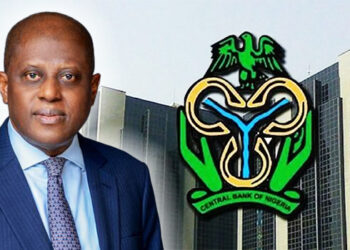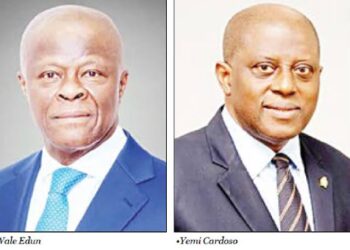Worried by the historically high levels of inflation, President Joe Biden of the United States met with Federal Reserve Chair Jerome Powell at the White House on Tuesday to discuss and find possible ways of tackling the scourge.
The Nigerian economy has been grappling with several challenges, ranging from Covid-19 lock down to economic recession and now to escalating inflation.
Between April 2020 and April 2022, headline inflation has risen by almost 450bps from 12.34% to 16.82%.
Some analysts put the market inflation rate based on the daily experiences on prices of consumer goods to over 60 percent
The persistent inflationary pressure in recent time fueled by elevated energy costs and food prices supported by the ongoing Russian-Ukraine war has been globalized. Hence, both advanced and developing economies commenced monetary tightening regime in a bid to rein in inflation.
The best the Central Bank (CBN)'s Monetary Policy Committee could do under the circumstances was, according to Bismarck Rewane, chief executive of Financial Derivatives Company, “a move that exceeded the expectations of market participants, the CBN commenced a tightening cycle after maintaining a status quo tradition for over 20 months.
For the first time in 70 months, the CBN raised the policy rate by 150bps from 11.5%p.a to 13%p.a.
While announcing its position on May 24, the CBN governor emphasized that its decision was a demonstration of its commitment to fight inflation. “
Biden sees the situation capable of impacting negatively on Americans
“declaring it a top priority for the administration while also reassuring the public that the economy remains strong."
At the meeting, President Biden and Powell signaled the growing urgency needed in fighting inflation, which remains at 40-year highs and has led to rising recession fears among investors who have been battered by a brutal market selloff this year.
The Federal Reserve raised interest rates by a half-percentage point earlier in May, its most aggressive increase yet in the battle against surging consumer prices.
With recently released minutes from the Fed’s latest policy meeting indicating that most officials favour similar 0.50% interest rate hikes at upcoming meetings in June and July, the central bank is on pace for its most aggressive rate-hiking cycle in decades.
The President reiterated on Tuesday that while bringing down inflation is a paramount concern, he will provide the central bank with the “independence it needs to tackle inflation,” Brian Deese, director of the National Economic Council, said at a press conference following Biden and Powell’s meeting. The Biden Administration remains committed to fighting inflation, which is a “global challenge”—as evidenced by the dismal euro zone inflation report earlier today—but is “not going to interfere” with the Fed’s work, Deese noted at the press conference. Prior to his discussion with Powell, Biden declared fighting inflation a “top economic priority” for his administration, according to his recent op-ed published in the Wall Street Journal. Despite gloomy outlooks on Wall Street about a possible recession, the U.S. economy is taking on inflation from a position of “relative economic strength” and is in a period of transitioning from a historically strong recovery to more stable, resilient growth. While the White House wouldn’t comment on specifics of Fed policy, Biden “agrees with the assessment” that the Fed is making on inflation and “has confidence in the people that he has nominated,” Deese said.
The Nigerian economy has been grappling with several challenges, ranging from Covid-19 lock down to economic recession and now to escalating inflation.
Between April 2020 and April 2022, headline inflation has risen by almost 450bps from 12.34% to 16.82%. The persistent inflationary pressure in recent time is fueled by elevated energy costs and food prices supported by the ongoing Russian-Ukraine war has been globalized.
But, the country is yet to present a seemingly coordinated approach even from the centre.
Also worrisome is the fact that there seem to be lack of complimentality between the monetary and fiscal policy measures.
While CBN is exploring orthodox measures of tackling the inflationary pressures, the country is experiencing spending spree, particularly, among the politicians and top civil servants.
Specifically, the equity market has been experiencing mixed bags of losses and ocassional gains.
READ ALSO:Malaysia’s Ban On Chicken Exports Takes Effect
Analysts expect a slowdown in the equity market as the fixed income rate might become appealing to investors in the near term, due possibly to the recent hike in monetary policy rate.
Besides the retinue of advisers, the president has other committees or council that are supposed to furnish him with economic direction and performance.
For instance, at the centre, there is the National Economic Council headed by the vice president.
It has the mandate to “advise the President concerning the economic affairs of the Federation, and in particular on measures necessary for the coordination of the economic planning efforts or economic programmes of the various Governments of the Federation.”
By Executive Order, the NEC has four key functions: to coordinate policy-making for domestic and international economic issues; to give economic policy advice to the President; to ensure that policy decisions and programs are consistent with the President’s economic goals; and to monitor implementation of the policies.
There is also the Federal Executive Council, (FEC),comprising the ministers and some advisers.
There was an issue recently, where a minister alleged that some members of the APC-led Federal Executive Council frustrated his request to install security surveillance equipment to avert terrorist attacks on the Kaduna-Abuja rail track, confirming lack of coordinated approach to national issues.
Nigerian economy is seriously challenged and needs political will, dedicated and proactive leadership to tackle them so that many citizens can be brought out of poverty.












